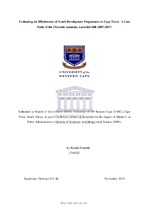Evaluating the effectiveness of youth development programmes in Cape Town: A case study of the Chrysalis Academy, Lavender Hill (2007-2017)
Abstract
The importance of the youth to the future of a country is acknowledged in the frequently used maxim that the youth of today represents the leaders of the future. If we want future leaders of high quality, it stands to reason that we should invest in the youth today, with a view to empowering them to become competent leaders. Across the world, the issue of youth unemployment is regarded as a major challenge, especially amongst countries in the developing world. The research problem in this study refers to the high rate of unemployment amongst the youth in a certain township in a metropolitan area in South Africa. It is acknowledged that unemployment affects all sectors of society and is prevalent everywhere, but the rate of unemployment amongst the youth in this township is unacceptably high. An attempt was made to conduct research on the matter, but was confined to one secondary school within the said township. This research project focuses on the selected community and involves graduates from a youth development programme that aims to address both the dearth of leadership in the community and unemployment, and is run by a non-government organisation (NGO). The research follows a mixed method approach, making use of a questionnaire survey and interviews with a sample of graduates and staff members of the NGO. The NGO was evaluated with regard to its effectiveness, relevance and sustainability. The finds revealed that the youth benefitted from the youth development programme, which prepared them for the challenges of their political, social and economic environment. The research makes a number of recommendations for the improvement of the programme, and also recommends that government be informed of the benefit of such programmes and be requested to consider improving its support for such programmes.

